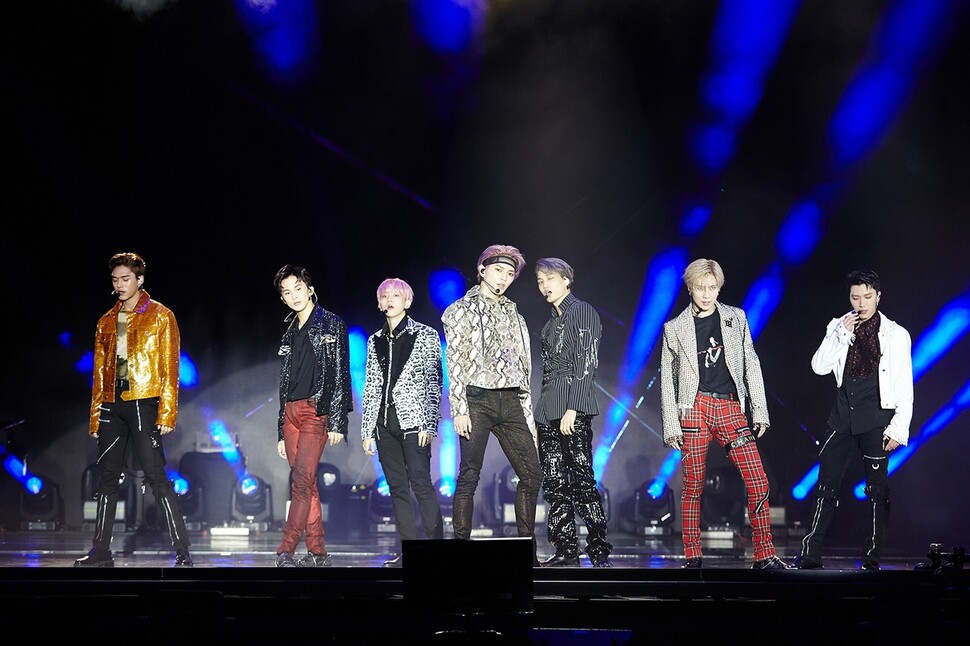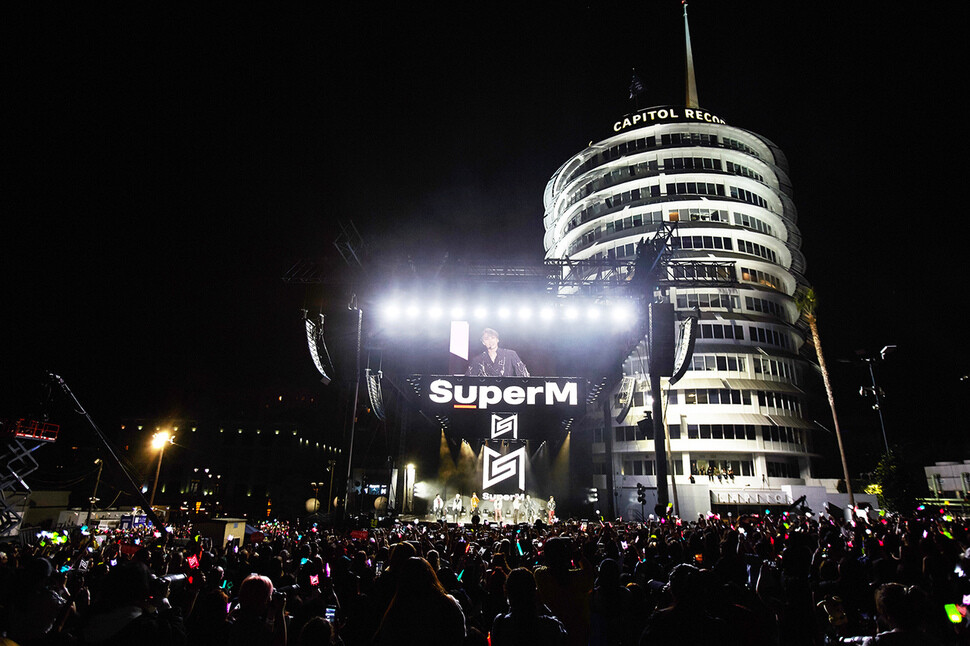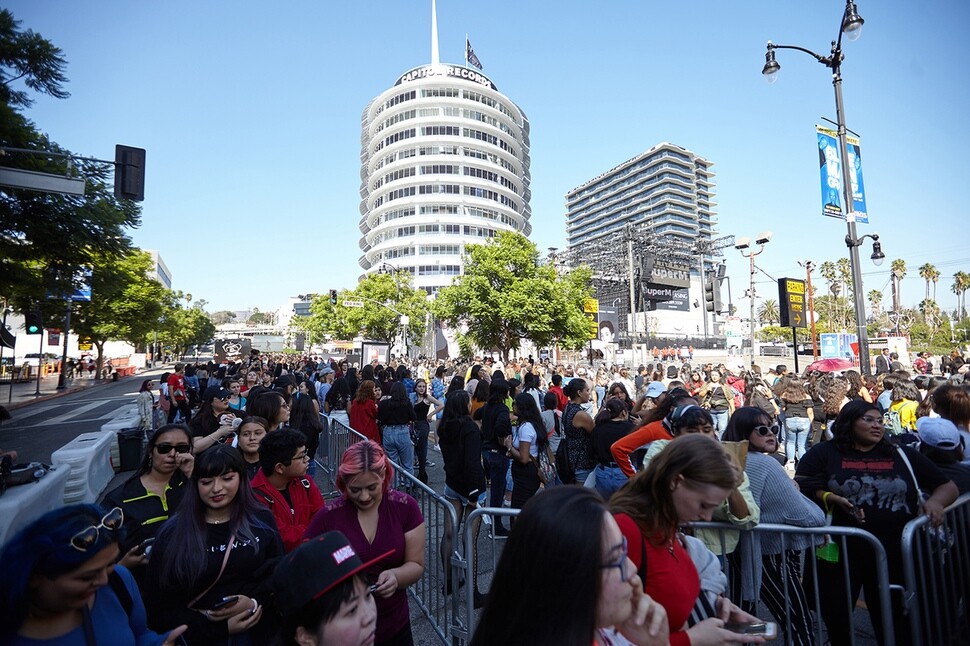hankyoreh
Links to other country sites 다른 나라 사이트 링크
[Review] Will new idol group SuperM become the next stage of evolution in K-pop?

What is the essence of K-pop? If its musical essence is the combination of a diverse lineup of genres and a flashy performance of music you can watch, its industrial essence is an elaborate localization strategy and a production system that can guarantee a consistent quality of music. The entertainment company that has refined these two aspects of the K-pop model for the longest time, and with the most sophistication, is SM Entertainment. SM and US-based Capitol Records have collaborated to create SuperM, a new idol group project that’s getting noticed. This can be seen as an intriguing project that underscores the ambition and pride of SM, which has staked its claim to the K-pop brand. This super group is made up of seven members from groups already signed with SM: Taemin from Shinee; Baekhyun and Kai from EXO; and Taeyong, Mark, Lucas, and Ten from NCT.
The SuperM premier took place at the Capitol Records Tower, in Hollywood, on Oct. 3. While it was unusual enough for a Korean group to debut in the US, the fact that the debut focused on the international press and American fans and that the event was broadcast live around the world on YouTube seemed to encapsulate K-pop’s reinvention as a global industry. The SuperM flag was hung from the Capital Records Tower, a Los Angeles landmark, and the premier was held at Studio A, where Frank Sinatra did some of his legendary recordings. It wasn’t hard to perceive the intense interest and support Capitol Records has given K-pop, which it hopes will breathe new life into the US’ sluggish record industry.

The showcase concert held two days later, on Oct. 5, was completely flawless, despite the short time group members had to prepare. SM’s goal was to achieve the synergy of a super band by deftly weaving together talented members, and that goal was at least partially achieved during the performance, in which the members’ skills and passion were on full display. Traffic was blocked around the concert venue, next to Capitol Records, and large numbers of fans unable to find a ticket cheered at the figures on the big screen, only boosting the excitement in the air.
SM’s fingerprints are all over SuperM — not only in the name, of course, but also in its composition and content. The inclusion of members who can target both the English-speaking and Asian markets represents the goal of localization, a hugely important keyword for the company, while the group’s uniquely slick and futuristic sound effectively showcases SM’s musical aesthetic. With its energetic combination of an infectious electric beat and driving guitar licks, title track “Jopping” (a portmanteau of “jumping” and “popping”) carries on the characteristic SM sound, which the company dubs “SMP,” short for SM Music Performance.
The icy-cold and complicated metallic stylings of “Super Car” and the crossover of Asian rhythms and harmonies with Western pop in “I Can’t Stand the Rain” are musical cues that push the right buttons for fans of SM music, signature sounds that need no tedious explanation.

Some fans’ resistance to artificial nature of group’s formation
It’s too soon to say whether SuperM will be a big success. Considering that the overseas K-pop fandom wants more candor and originality from entertainment agencies than ever before, the SuperM concept may face some limitations. What does seem clear, however, is that SuperM’s debut serves as a “sampler” of the key elements of SM’s accumulated expertise, or in other words its “culture as skill.” And just like samplers at popular restaurants, SuperM might well become SM’s latest and greatest crowd favorite. The reason why SM is fully backing SuperM despite some fans’ resistance to the artificial nature of the group’s formation is ultimately because the success the agency is seeking is not that of any one group but of the overarching SM brand, or genre.
Seeing fans singing along with the SM music videos being screened as they waited for the concert to begin has a number of implications: it illustrates the “multifandom” that’s characteristic of American K-pop fans — who are equally supportive of all the artists produced by SM, and not just the bands connected with SuperM — and their faith in the SM brand. Such observations are likely what gave SM, which has striven so long to make its name a synonym of K-pop, the confidence and boldness to debut SuperM in the American market. This super group project, which puts into practice the “global K-pop model” (hopping over the usual starting point of Korea), is a sharp move by SM that’s not likely to fail, a bid for new momentum and dominance in the golden age of K-pop by the very agency that was first to jump into overseas markets twenty years ago.
By Kim Yeong-dae, music critic
Please direct comments or questions to [english@hani.co.kr]

Editorial・opinion
![[Column] How tragedy pervades weak links in Korean labor [Column] How tragedy pervades weak links in Korean labor](https://flexible.img.hani.co.kr/flexible/normal/500/300/imgdb/original/2024/0703/8717199957128458.jpg) [Column] How tragedy pervades weak links in Korean labor
[Column] How tragedy pervades weak links in Korean labor![[Column] How opposing war became a far-right policy [Column] How opposing war became a far-right policy](https://flexible.img.hani.co.kr/flexible/normal/500/300/imgdb/original/2024/0702/5017199091002075.jpg) [Column] How opposing war became a far-right policy
[Column] How opposing war became a far-right policy- [Editorial] Korea needs to adjust diplomatic course in preparation for a Trump comeback
- [Editorial] Silence won’t save Yoon
- [Column] The miscalculations that started the Korean War mustn’t be repeated
- [Correspondent’s column] China-Europe relations tested once more by EV war
- [Correspondent’s column] Who really created the new ‘axis of evil’?
- [Editorial] Exploiting foreign domestic workers won’t solve Korea’s birth rate problem
- [Column] Kim and Putin’s new world order
- [Editorial] Workplace hazards can be prevented — why weren’t they this time?
Most viewed articles
- 110 days of torture: Korean mental patient’s restraints only removed after death
- 2[Column] How opposing war became a far-right policy
- 3Nine dead in Seoul after car plows into pedestrians
- 4[Editorial] Korea needs to adjust diplomatic course in preparation for a Trump comeback
- 5In the blink of an eye, an unthinkable crash turned a night out into a nightmare
- 6Experts cast doubt on driver’s claim that sudden unintended acceleration caused deadly crash
- 7Families, friends mourn loved ones cut down in prime in deadly car crash
- 8Korea to create dedicated population strategy ministry to combat low birth rate, aging society
- 9Democrats seek to impeach 4 prosecutors, including those tied to probes into Lee Jae-myung
- 10KCC chief resigns to avoid impeachment, the second in 7 months